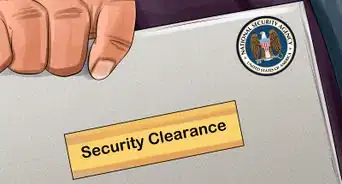This article was co-authored by Clinton M. Sandvick, JD, PhD. Clinton M. Sandvick worked as a civil litigator in California for over 7 years. He received his JD from the University of Wisconsin-Madison in 1998 and his PhD in American History from the University of Oregon in 2013.
There are 13 references cited in this article, which can be found at the bottom of the page.
This article has been viewed 41,954 times.
Whether you are looking for the security and stability of the civil service or want to better yourself through public service, there is a government job to suit your goals. However, the job search and application process can be long and complicated. Knowing where to start and how to use the tools provided by the government can help you land the job of your dreams.
Steps
Preparing to Apply for a Job in Government
-
1Understand the different types of government jobs. The phrase "working for the government" actually encompasses a significant percentage of the workforce. From the orange-vest clad public works employees clearing the streets after a storm, to high level legal and medical careers in Justice and Health, government jobs cover all skill levels. In fact, your career in public service can begin as close as the local City Hall.
- Statistically, government employment, as percentage of the workforce, is at a historic low. However, approximately 16 percent of the adult workforce is employed by some branch of government.[1]
- Jobs in city or county government can be a stepping stone to positions with the state or federal government. Large cities may have a Civil Service employment system where have to register and possibly take a civil service exam as part of your job search. Smaller cities, towns, and counties will likely advertise job openings in the local newspaper.
- Employment with your state government will be advertised differently in each state. Most state jobs will be clustered around the state capital, but, certain segments, such as transportation, Fish & Wildlife, and law enforcement will have assignments distributed across the state.
- The federal government operates on a grade system. All job listings are in a central database and each job will have a grade range that governs the salary range based on criteria including experience and education. The classifications are usually quite rigid and you must meet the basic qualifications to be considered. Most federal jobs are in and around Washington D.C., but many departments have satellite offices around the country.
- Another route to working for the federal government is to join the staff of an elected official. Each member of Congress handles his own hiring decisions.[2]
-
2Assess the variables how you can improve your chances at employment. This requires some honesty and self-examination. Government employment, even down to the township level, is very competitive. Viewed as a secure, and often prestigious, career path, there will likely be many applicants for each position.
- Location is the first variable you can control. Most government jobs require that you live in the jurisdiction or can relocate in a short time, usually six months. Don't apply for a public service job in another area unless you are prepared to move.
- You will have to be able to prove your right to work in the United States. All candidates for government employment will have to able to successfully complete an Employment Eligibility Verification form. Commonly call an I-9, this form requires that you be able to produce two physical forms of identification from the approved list. The most common are your driver's license and Social Security card. You can also use a valid passport and other citizenship documents. Make sure you have these documents in hand when you apply for work.[3] [4]
Advertisement -
3Improve your education. Some government jobs, such as public works, maintenance, and mechanics may likely rely more on your experience. However, most government jobs will have very specific minimum education requirements. Depending on your goals, review job listings to see the what level of education you will need to be considered for the position.
- Community college is a good place to gain basic skills such as typing, computer usage, basic foreign languages, and writing skills.
- If a government job description specifies a certain college or graduate degree, you will have to obtain it before you would be considered, even if you have significant experience.
-
4Prepare for pre-employment background checks and screens. Depending on the job, you can also expect to submit to pre-employment drug screens, background checks, and possibility security screenings.
- If you have any sort of criminal record, strongly consider talking with an attorney about the possibility of expunging your record before you apply for government employment.[5]
- There are several levels of security classifications in federal employment. Non-sensitive positions will usually be limited to a public records check. The highest level is "National Security". If the job you are looking is a natural security classification, investigators will examine your background, including interviewing friends, family, and former employers for as many years as necessary to satisfy the needs of the position.
-
5Ensure your tax accounts are in order. Many states, such as Kansas, require that you submit a certification that your state taxes are up-to-date and in compliance with state laws. Even states or counties without this separate step may include a review of your tax status as part of the pre-employment background check.[6]
-
6Investigate the government "Veterans' Preference" in employment. Many government jobs will be designated as having a "Veterans' Preference." While this is not a guarantee of a job, it can boost a veteran over similarly qualified candidates.
- The Preference is a point system based on dates of active service, receipt of a campaign badge, Purple Heart, or having a service-related disability. Calculating your Veterans' Preference score is complicated. The Department of Labor has an interactive website that can help you determine if you are entitled to claim the Preference.[7]
- You will have to produce a copy of your separation papers, including a DD-214, "Certificate of Release or Discharge from Active Duty." This available free of charge from the National Archives.[8]
Researching Opportunities in Government Employment
-
1Search the federal government employment job listings. All jobs that fall under the oversight of the Office of Personnel Management are listed in the central website at https://www.usajobs.gov/ You can browse and perform keyword searches to find positions that both interest you and match your education and qualifications.
- At this stage, experiment with a broad range or keywords. For example, the keyword "driver" brings up jobs with the National Parks system, civilian operations on Army bases, and emergency medical technicians.
-
2Create an account at USAJOBS. This account will let you save interesting federal jobs and track the status of your applications. To do this you will need an email address. Consider creating an email account that is strictly for applying for job. This will keep job-related emails from being mixed up with your personal email and it allows you to keep your friends and family email private.
- Use a web-based email provider such as Gmail. There are two main advantages to this instead of an account through your Internet service provider. First, web-based mail is easily accessible from any computer, tablet, or smartphone. Second, applying for government jobs is a slow process. It can take up to a year. If you move or change Internet providers, you will not lose your email address.
- Make the email address very neutral. The best choice is your name. If your name is not available, mix and match your initials or add "resume" or "employment" to your name. "johnsmithresume@gmail.com" is preferable to "johnsmith9985634@gmail.com." Whatever you choose, reserve the clever and colorful names for your friends.
-
3Check out opportunities with elected officials. The place to start is with the representatives and senators in your own state, preferably your own congressional district. Call the office and ask who you should address your resume to. It may be the Chief of Staff or a designated administrative staffer.
- Volunteer to work on a political campaign or volunteer as an intern. This is both a way to showcase your skills and show your loyalty. Campaign work is also a good way to start on the network of contacts that can help you find your government dream job.[9]
- Each state will also have a job bank that is accessible through the main state website. Follow the instructions based on your state or the state you would be willing to move to if you were offered employment.
- Many state sites will also let you view job openings in county government.
-
4Review local newspapers for county and city jobs. Positions with local government will be announced in the newspaper that is the designated legal newspaper for the area.[10] Notices may also be posted on local websites or job boards, but the newspaper will be the most reliable source of up-to-date job ads in local government. If you are unsure of which newspaper is designated for legal notices, contact the county or city clerk and ask.
-
5Conduct informational interviews. Even though there are rules in place for obtaining a government job, taking part in informational interviews can still be a helpful step in impressing government employers. Informational interviews are informal conversations meant to solicit information and advice about jobs. It is not a job interview and the purpose is not to get hired. Instead, an informational interview gives you an opportunity to talk with people in the government workforce about their career paths and backgrounds.
- To conduct a successful informational interview, find government workers to contact and set up a time to meet with them in person. When you do meet them, dress professionally and arrive early. Introduce yourself and tell the government employee why you wanted to talk to them (i.e., for information and advice). Ask them about their career path and how they enjoy the job they have. Ask if they have any other contacts that may be helpful to you and ask them to keep you in the loop if they see any opportunities that might fit your background.
- After the interview, always follow-up with the government employee and thank them for their time. Let them know you are implementing their suggestions and that you will keep them updated on your career progress.
Applying for Government Jobs
-
1Create your resume. Your resume is the document that introduces you and your skills to potential employers. The format will vary depending on how you are applying for the job, but the main sections will be your contact information, your education, and your experience.[11]
- Create your resume in a word processing program. In one file, format the document to look attractive when printed on paper. In another file, have only the text with no indenting, flourishes, or formatting. You can use the text file to cut and paste your information into the computer form job applications that are becoming more common.
- For conventional job applications, print your resume on nice quality plain white or cream paper. Use a simple standard serif font such as Times New Roman. This will be one of the default fonts on your computer. Do not insert images, logos, or clip art. More employers are scanning resumes and emailing them to managers. You want your resume to come through clean and clear.
- Have two people proofread your resume. One to check it for typographical and grammar errors. The other should not be familiar with your background and should read it for clarity and descriptiveness.
-
2Generate online employment profiles. USAJOBS and many state employment websites require you to create an online job profile. The complexity will vary. Some will be basic contact information and an electronic copy of your resume. Others will be fully templated and act as a fully-formed job application that you will use for all vacancies.
- Government job searches and applications can take a long time to go through the system. Make sure you keep your profiles up to date. Whether you are adding new education and skills or keeping your contact information current, it is critical that your profile shows you in the best light.
-
3Follow application instructions exactly. Whether you are applying for a management position with a government agency or a clerical position with the local water department, it is critical that you follow directions with your application. These agencies receive a lot of resumes and have developed procedures for handling the paper flow.
- For example, if the listing says to apply through the website or mail your resume to a post office box, do not hand deliver it. It the directions say "no staples or clips," then do not staple or clip. Scented paper, stickers, greeting cards, etc. are not going to get you positive attention.[12] [13]
- Include all requested attachments. Do not submit your application until you have all the documents in hand. If you are instructed to submit transcripts, licenses, or reference letters, make sure they are included with your original application.
References
- ↑ http://www.businessinsider.com/government-worker-percentage-2015-1
- ↑ http://careers.cua.edu/res/docs/handouts/capitol-hillfall07.pdf
- ↑ http://www.uscis.gov/i-9
- ↑ http://www.uscis.gov/sites/default/files/files/form/i-9.pdf
- ↑ http://criminal.findlaw.com/expungement/expungement-and-criminal-records-state-specific-information.html
- ↑ https://admin.ks.gov/services/state-employment-center/sec-home/state-employment/tax-clearance-certificate
- ↑ http://webapps.dol.gov/elaws/vets/vetpref/mservice.htm
- ↑ https://www.archives.gov/veterans/military-service-records/
- ↑ http://careers.cua.edu/res/docs/handouts/capitol-hillfall07.pdf
- ↑ http://nnaweb.org/public-policy?articleCategory=public-notice
- ↑ http://theinterviewguys.com/objective-for-resume/
- ↑ http://idealistcareers.org/eight-common-mistakes-to-avoid-when-job-hunting/
- ↑ http://govcareers.about.com/od/JobSearch/tp/10-Mistakes-That-Will-Get-Your-Job-Application-Thrown-Away.htm
- ↑ http://www.uniformlaws.org/ActSummary.aspx?title=Management%20of%20Public%20Employee%20Retirement%20Systems%20Act










































































